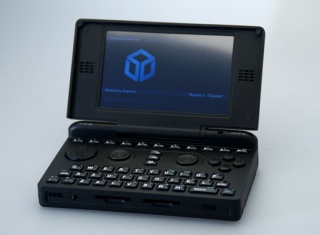Difference between revisions of "Pandora"
Spiralofhope (talk | contribs) (→Pictures: - removing this section until there's something to show) |
Spiralofhope (talk | contribs) m (→More Information) |
||
| Line 112: | Line 112: | ||
= More Information = | = More Information = | ||
| + | * [[FAQ]] | ||
| + | * [[Hardware documentation]] | ||
* [[Pandora history]] | * [[Pandora history]] | ||
[[Category:Hardware]] | [[Category:Hardware]] | ||
[[Category:List]] | [[Category:List]] | ||
Revision as of 08:22, 20 June 2012
|
This wiki is an unofficial community project. Open Pandora Ltd. is not responsible for its content, and it should therefore not be treated as an official source of information about your device. The information contained in this wiki may be incorrect and/or out-of-date. |
|
Have some expertise, or just some spare time? Get involved! |
Contents
Overview
The Pandora is a unique combination of gaming console and pocket computer.
It is the spiritual successor to other handheld consoles such as the GP32 and GP2X. There is currently no other device that has dedicated gaming controls, two analog nubs and a QWERTY keyboard.
It was developed as a gaming device not just to run games made just for it but also to emulate older systems. From home consoles like the Atari 2600, NES, SNES, Sega Master System, Sega Genesis and Neo Geo to handheld consoles like the Game Gear, Game Boy/Color/Advance to traditional arcade cabinet games. It can also emulate entire computer systems, from the Commodore 64 and Amiga to old Apple Macintosh computers or a PC with DOS.
The Pandora can do all of this because it is a tiny computer running a custom distribution of Linux based on The Ångström Distribution. Because it runs Linux, the Pandora isn't just a console but a complete desktop computer with access to tens of thousands of Linux programs.
From classic gaming, listening to music, watching movies, viewing pictures, program development or surfing the web to just reading or writing texts, the Pandora has a lot to offer.
|
|
Our FAQ has more detailed information.
Visit the Pandora website for ordering information.
Specifications
Hardware documentation has detailed hardware specifications.
- 320g (0.739 lbs)
Core Hardware
- 512MB DDR SDRAM.
- 512MB internal storage (NAND)
Display
- Touchscreen TFT-LCD
- 4.3-inch (93.6 x 56.2 mm)
- 800x480 widescreen (5:3)
- Brightness: 300 cd/m2
- Contrast ratio: 450:1
- Viewable in direct sunlight, but it will wash out.
- Response time: tr+tf=30ms
- No ghosting.
- TV-out included in hardware, A/V-OUT Port (similar in appearance to a large USB OTG port) has Composite and S-Video outputs and 3.5mm headphone output and microphone input.
- Separate TV-out signals, picture-in-picture capabilities. [1]
Audio
- Stereo speakers
- Volume control wheel
- Microphone
Input
- QWERTY keyboard
- Gaming controls:
- 8-way D-pad
- Four gaming buttons
- Two shoulder buttons
- Two analog nubs
- Touchscreen
- Microphone
Connectivity
- Bluetooth 2.0 + EDR (3Mbps)
- USB
- Standard-A USB host port
- Fully powered (500 mA)
- USB On-The-Go mini-AB port.
- You can use anything that has the appropriate drivers. [2]
- Some devices need to first go through a powered USB hub.
- Standard-A USB host port
Power
- Lithium-ion polymer battery, ~4000mAh.
- 10-14 hours battery life under reasonable load.
- 8.5 hours under max CPU load
- ~17 hours playing music with the display off (source)
- Can charge through an AC adapter or USB. [4]
- Advanced power management capabilities: only need to set a max clock speed; when the CPU is not doing anything it automatically HALTs and does nothing to save power. [5]
- Suspend to RAM or suspend to disk functionality is being developed. This will give longer battery life and faster start up.
- See Power modes.
